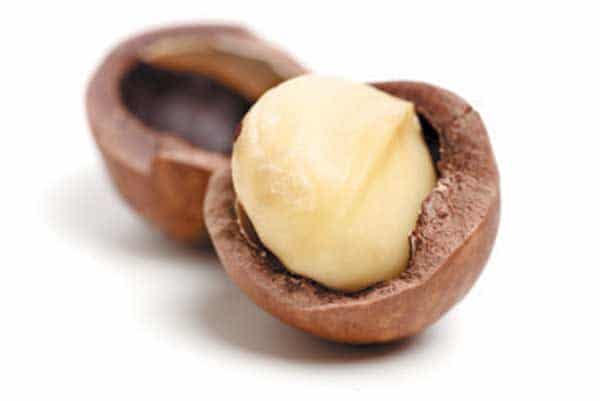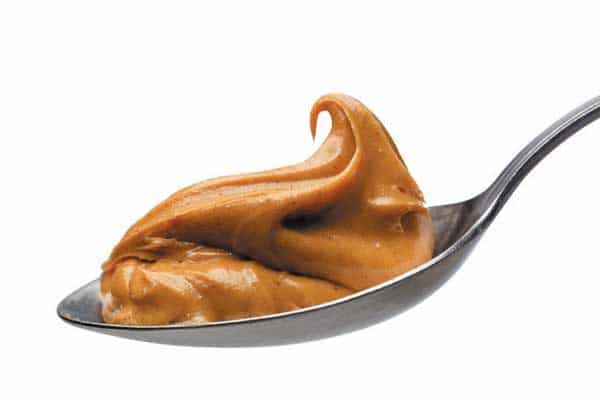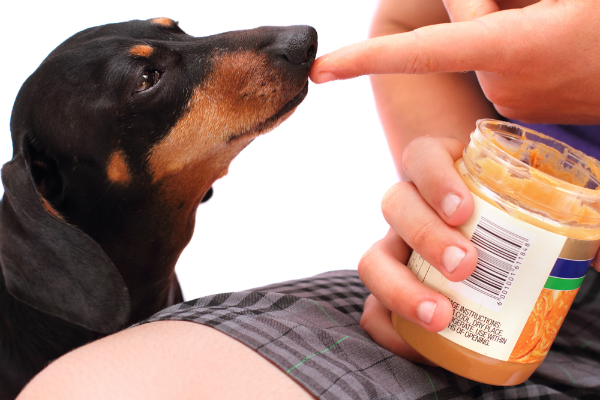As a vegan, I love integrating nuts into my diet. I often bake with almond flour, drink almond and cashew milk (homemade when I’m not too lazy!), and spread a dollop of nut butter on a gluten-free bagel. Many people who love nuts as I do want to share their crunchy/creamy goodness with their dogs, but is that wise? Let’s take a closer look at the facts surrounding nuts and dogs so that you can decide for yourself, without going, well, nuts over the topic.
Nut cautions

While some varieties of nuts are not toxic, they can create health problems. Let’s take a look at some risks surrounding feeding nuts to dogs.
Choking hazard: Our canine children don’t always chew their food. In fact, they often seem to inhale it. This can create a choking hazard when it comes to nuts. Whole nuts are a perfect size for getting lodged in the throat, potentially turning a treat into a tragedy. Any nut swallowed in its shell poses an even greater choking danger.
Intestinal blockage: If a dog swallows a whole nut, it can become lodged in the intestinal tract, causing a blockage that can require veterinary intervention or even life-saving surgery. While any nut can cause a blockage, large or jagged nuts such as walnuts, pecans, hazelnuts and Brazil nuts are especially dangerous. A nut swallowed in its shell compounds the risk.
Gastric distress: Even chewed nuts break down into little, jagged, abrasive pieces, which are difficult to digest and can irritate the gastrointestinal tract, resulting in problems such as stomachaches or pains, nausea, gas and/or diarrhea. Dogs suffering from intestinal inflammation are especially at risk of further irritation.
Specific problems caused by nuts
Below are three conditions your dog is at risk for if he consumes the wrong type of nut.
Aflatoxicosis: This type of poisoning results from ingesting foods contaminated with aflatoxins, a toxic substance produced by the fungi Aspergillus flavus and Aspergillus parasiticus. Nuts (especially peanuts and tree nuts such as Brazil nuts, pecans, pistachios and walnuts) are highly susceptible to mold that can result in aflatoxin contamination. Aflatoxicosis primary affects the liver, and acute toxicities can result in death from liver-related damage, while prolonged exposure can lead to liver cancer. If you suspect your dog has ingested moldy nuts, visit the vet immediately.
Tremorgenic mycotoxin intoxication: Some foods, including moldy dairy products, grains and moldy walnuts or peanuts can produce tremorgenic mycotoxins, toxins that affect the nervous system and which, left untreated, cause severe or even life-threatening problems. Signs include fine muscle tremors that worsen to total-body tremors and then convulsions that can lead to death.
Pancreatitis: Most of us know nuts are high in fat, but you may not have considered just how high in fat they are. High-fat foods can lead to acute pancreatitis, a painful and dangerous condition requiring veterinary treatment. Fatty foods can also quickly lead to weight gain and obesity.
The lowdown on peanuts
What about everyone’s favorite “no nut” nut, the peanut? Unlike tree nuts, peanuts grow underground and are actually legumes (but we won’t tell that to all the dogs who love their peanut butter treats!).
Like other legumes, peanuts (and peanut butter) are an excellent source of protein. However, as with tree nuts, peanuts are high in fat. Smooth-style peanut butter contains about 51 percent fat, or almost 161/2 grams per tablespoon. That represents the National Research Council’s (NRC) total daily recommended allowance (RDA) of fat for a 42-pound, healthy adult dog!
Peanut butter should be doled out sparingly. Dogs prone to pancreatitis or who suffer from a condition that warrants a dietary reduction in fat should not eat peanut butter.
My tip: Replace high-fat peanut butter in home-baked treats with organic peanut flour that has been partially de-fatted. Your dog will get the same great peanut-y taste with a fraction of the fat. You can even mix it with water to make a thick, lower-fat PB substitute.
Beware of peanut allergies

Like people, dogs can suffer from a life-threatening peanut allergy resulting in anaphylaxis, a severe, whole-body hypersensitivity reaction. Signs include difficulty breathing; difficulty swallowing; swelling of the face, eyes or tongue; and unconsciousness. If your dog has never eaten peanuts, introduce a tiny amount first. If your dog exhibits any signs of an allergy, immediately visit your veterinarian or the nearest veterinary emergency clinic.
Warning: Xylitol
Whatever nut butter product you choose, be sure it is free of xylitol, an artificial sweetener that is extremely toxic to dogs. Xylitol is showing up in a lot of common food items, including nut butters. In dogs, xylitol ingestion causes a rapid and life-threatening drop in blood sugar, which can be fatal if left untreated.
Dogs love peanut butter, and healthy dogs can enjoy it sparingly. The risks of feeding other nuts to dogs outweigh the benefits. Avoid them and opt for more appropriate, lower-fat treats.
Read more about dog food on Dogster.com:
- Can Dogs Eat Onions? If Your Dog Ate Onions, What Do You Do?
- Wondering How Much to Feed a Dog? Let’s Talk How Many Calories Dogs Need
- So, Your Dog Ate a Chicken Bone — Here’s What to Do
Featured Image Credit: dogboxstudio / Shutterstock.





